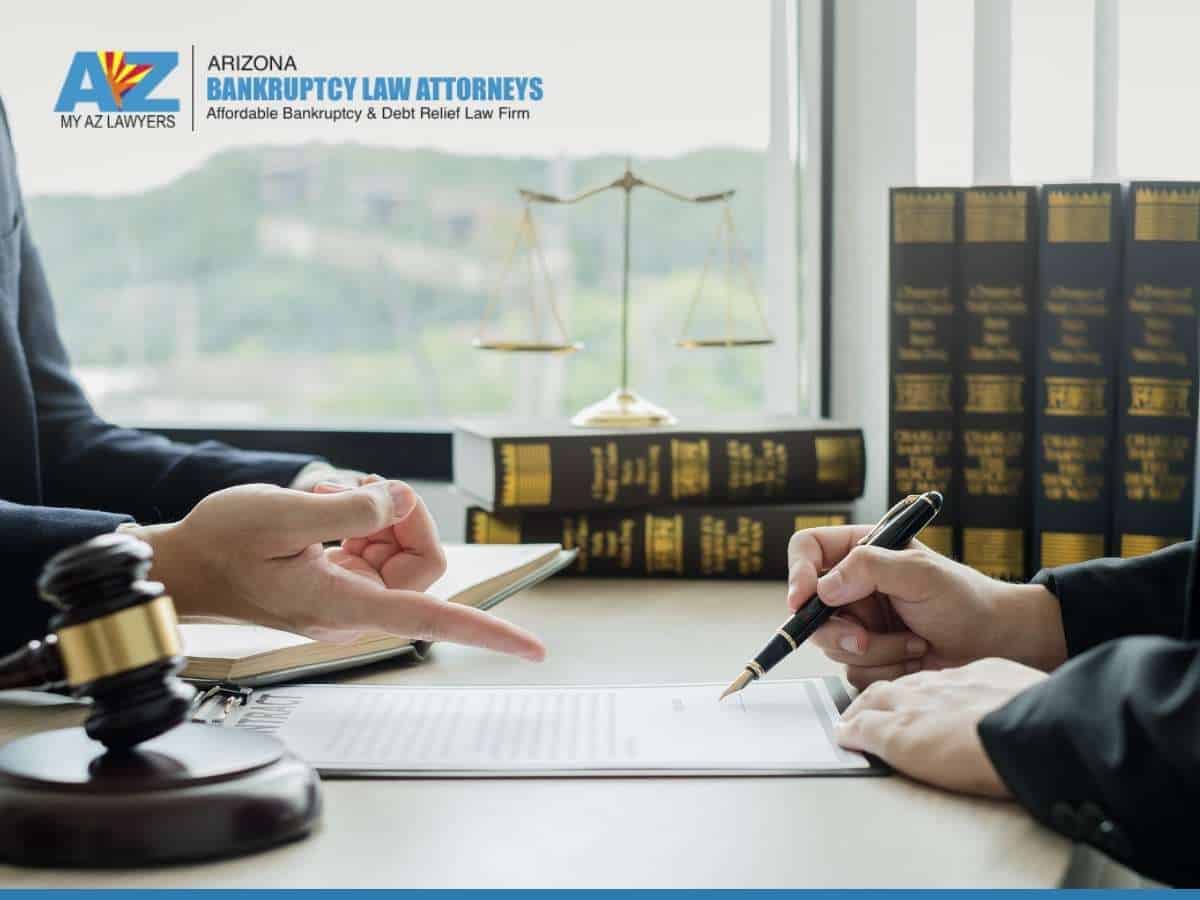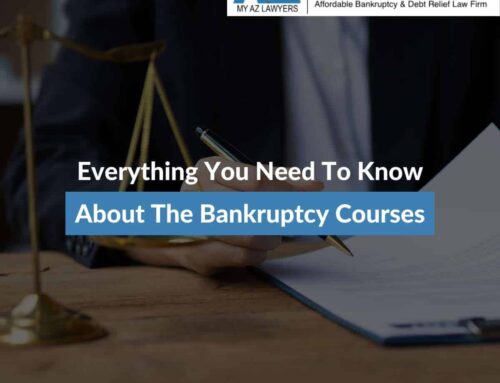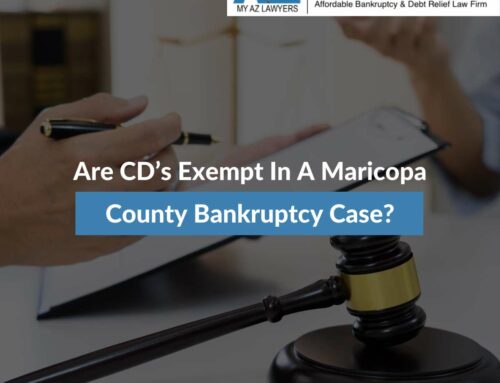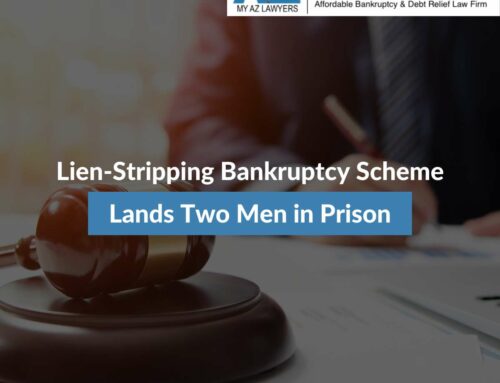Can Filing Bankruptcy Get Rid of a Lawsuit Filed Against Me In Arizona?
It’s an experience no one wants to go through- maybe it’s a knock on the door, or a stranger even greets you in public with a packet of paperwork. You’ve been served notice that someone has filed a lawsuit against you. Here, the person or entity that filed the lawsuit would be the “plaintiff,” and you (along with anyone else named in the lawsuit) would be the “defendant.” There are an infinite number of reasons why a plaintiff might file a lawsuit against a defendant. But depending on the type of lawsuit, you could pause or even entirely stop the lawsuit process by filing for bankruptcy. There are a variety of factors that will affect how much bankruptcy can help your situation. To learn more, schedule your free consultation with one of our seasoned Arizona bankruptcy lawyers today at 480-448-9800.
The Automatic Stay & How It Applies In Bankruptcy
The automatic stay is the main draw to bankruptcy for many debtors. This is a legal protection that goes into place when a debtor declares bankruptcy. As long as the case is in good standing, the automatic stay protects the debtor from wage garnishments, bank levies, repossessions, and more- including lawsuits. What happens after bankruptcy, when the automatic stay’s protections cease, depends on the type of lawsuit and what happened in the bankruptcy.
In most cases, the automatic stay and all of its protections will last until your case closes, either through discharge or dismissal. From filing to discharge, Chapter 7 typically takes 3 to 6 months, and Chapter 13 takes 3 or 5 years. Chapter 7 bankruptcy may wipe out the debt which is the reason the plaintiff is suing you. If so, the creditor will have no grounds to proceed with a lawsuit after your bankruptcy has been discharged. But Chapter 7 mainly addresses debts like credit cards and medical bills- it can’t clear secured debts for assets you wish to keep. For example, let’s say a debtor files for Chapter 7 bankruptcy and stops the home foreclosure process. However, the debtor is several thousand dollars behind on their mortgage and can’t catch up in the few months that their case lasts. If the debtor can’t catch up or work out an agreement with the mortgage lender before their bankruptcy is discharged, the lender can proceed with the foreclosure.
In these types of circumstances, it may be more advantageous for the debtor to declare Chapter 13 bankruptcy. Chapter 13 reorganizes debts, including any the plaintiff is suing for, into a payment plan that lasts 3 or 5 years. Here, the creditor would have no grounds for a lawsuit after the bankruptcy because the bankruptcy would pay off the debt.
Relief From The Automatic Stay
The automatic stay is a powerful protection, but sometimes creditors can bypass it to proceed with collection anyway. This is done when your creditor files a Motion for Relief from the Automatic Stay. If the court grants a creditors’ motion for relief from the automatic stay, they will be allowed to continue the action that filing bankruptcy stopped, whether it be a repossession, foreclosure, eviction, etc. A Mesa bankruptcy attorney can help you defend your case’s status if one or more of your creditors files this motion.
Cases That a Bankruptcy Filing Won’t Stop
Some lawsuits are partially or fully immune to the effects of the automatic stay. If a landlord has already secured a writ of possession in an eviction, it is too late for the defendant to stop the process using bankruptcy. A bankruptcy filing also won’t do anything to stop a criminal prosecution. Family law matters like child custody, child support, and the establishment of paternity won’t be stopped by a bankruptcy filing, either. The types of cases bankruptcy can stop are civil and financial matters. Examples include breach of contract and other financial disputes, an unpaid balance on a credit card or personal loan, personal injury compensation, eviction (limitations apply), repossession and foreclosure, and more. Bankruptcy can even stop the court from revoking your driver’s or professional licensure due to failure to pay fees. Talk to a Phoenix bankruptcy attorney if you are unsure about how your (potential) lawsuit will be impacted by declaring bankruptcy.
Evictions & Bankruptcy
As mentioned above, eviction lawsuits don’t stop due to a bankruptcy filing if they have progressed to the possession phase. That doesn’t mean that bankruptcy can’t help you in general in an eviction matter. You may have seen movies and television shows that show a landlord simply changing the locks or kicking out a tenant for some transgression with no repercussions. However, these portrayals aren’t based on reality because there are protections for tenants in Arizona and across the nation. Once someone has gained tenant rights, a landlord must formally evict them to remove them from the residence. This involves providing notice, serving a summons, and showing up in court to prove to the judge why you should be evicted from the property. Obviously, this process is not instantaneous. Filing bankruptcy at any point described here will halt the eviction process. However, if the tenant is being evicted for a cause other than non-payment of rent, such as selling illegal drugs on the property, the court will probably let the landlord continue with the eviction.
What Can I Do After My Landlord Has Secured a Judgment?
All hope is not lost if you’re too late to stop eviction with a bankruptcy filing. You can always attempt to work out an alternative agreement with your landlord, although you lose leverage after your landlord has secured a judgment for possession. Some states allow you to reinstate rent after an eviction, but Arizona offers a different process. If negotiations fail, you can file an appeal of the judgment with the court. You must also pay a supersedeas bond of $250 to appeal an eviction judgment. If you can’t afford the supersedeas bond, you should ask the court for a fee waiver or deferral. This must be done within 5 days of the judgment being issued. Contact a landlord-tenant attorney for more information about this process.
Filing Your Bankruptcy Petition Before Your Creditor Obtains a Judgment Against You
If you’re being sued for a debt, you may not see the urgency in filing your petition before your creditor wins their lawsuit against you. But there can be benefits to getting your bankruptcy case in with the court before your creditor secures a judgment against you. One of these is avoiding your creditor garnishing your wages, levying your bank account, or doing anything else with the judgment they obtain. These can stain your credit and be embarrassing to confront. If you wait until after the judgment is secured and your bankruptcy petition takes longer to prepare than expected, you could end up losing income and assets to your creditor while preparing to declare bankruptcy.
Another reason it is beneficial to file bankruptcy before a judgment is that your creditor may be able to use a judgment to place a lien on your property. Once this happens, the debt is no longer unsecured. It becomes a secured debt, which is not dischargeable in Chapter 7 bankruptcy. If you file Chapter 7 after a lien has been placed on your property, the lien will remain in place after your case has been discharged and until you pay the balance. Additionally, if the court finds you guilty of fraud in the plaintiff’s allegations against you, the debt won’t be dischargeable in bankruptcy. Filing bankruptcy before the lawsuit can help avoid the risk of your debts to the plaintiff being deemed fraudulent and non-dischargeable.
Filing After Your Creditor Has a Judgment Against You
Declaring bankruptcy after your creditor has already won their lawsuit against you can still have massive benefits. Doing it before your creditor can place a lien on one of your assets prevents it from becoming a secured debt. Even if your creditor has already begun garnishing your wages or placed a lien on your property, filing bankruptcy could free up disposable income if you are juggling other debts.
Arizona Bankruptcy Lawyers for Lawsuits, Judgments, & Other Specialty Debt Issues
Filing bankruptcy as a defendant in a lawsuit is no simple matter. This increases the chances that you may be required to attend an adversary proceeding as part of your bankruptcy case. Issues at your adversary proceeding could result in you remaining liable for certain debts after bankruptcy, your case being dismissed, or even you are being charged with fraud. Our bankruptcy team at My AZ Lawyers can make sure your case goes off without a hitch. We also provide affordable pricing solutions that can make filing bankruptcy to stop a lawsuit more realistic with your current budget. To learn more, call 480-448-9800 to schedule your free consultation today.
Mesa Bankruptcy Law Office
Mesa Bankruptcy Lawyers
4065 E University Dr #500
Mesa, AZ 85205
(480) 470-0005
Phoenix Bankruptcy Law Office
668 North 44th Street, Suite #300
Phoenix, AZ 85008
(480) 833-8000
Glendale Bankruptcy Law Office
My AZ Lawyers
20325 N. 51st Ave.
Suite #134
Glendale, AZ 85308
(623) 640-4945
Tucson Bankruptcy Law Office
My AZ Lawyers
2 East Congress St. Ste. 900
Tucson, AZ 85701
(520) 306-8729
Avondale Bankruptcy Law Office
My AZ Lawyers
12725 W. Indian School Rd.Suite E, #101
Avondale, AZ 85392
(623) 399-4222
Additional Information at:
Phoenix Bankruptcy Lawyer
Mesa Bankruptcy Lawyers
Phoenix DUI Lawyer
Chandler Bankruptcy Lawyer
Tempe Bankruptcy Lawyers
Vegas Zero Down Bankruptcy Attorney
Gilbert Bankruptcy Lawyers
Tucson Bankruptcy Lawyer
Arizona Zero Down DUI
Las Vegas Bankruptcy Lawyers
AZ Bankruptcy Lawyer







